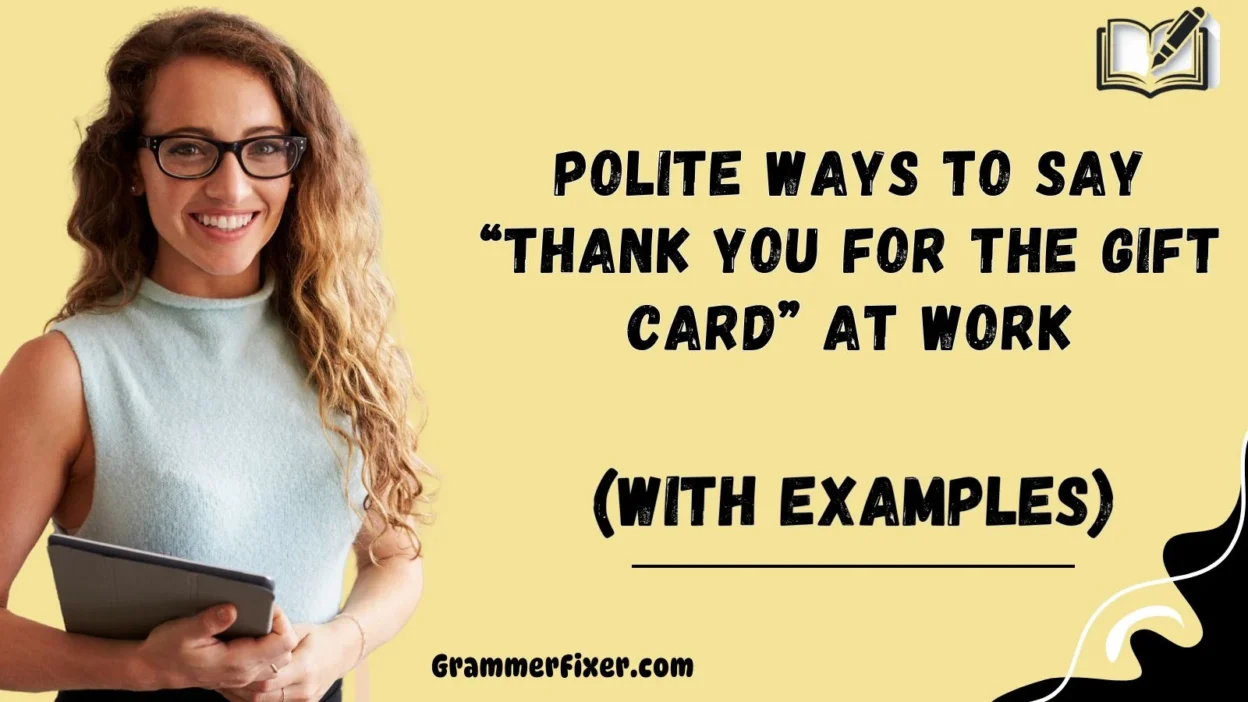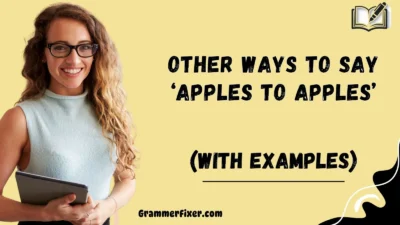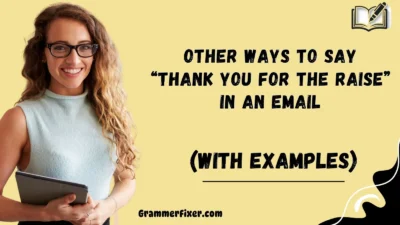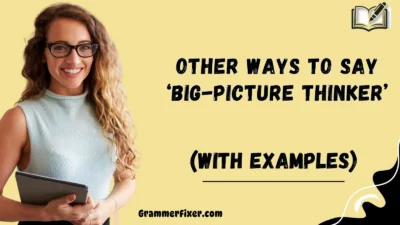Finding the right words to express your gratitude at work can make a huge difference. Saying “Thank you for the gift card” is nice—but sometimes it can feel a little too generic or unoriginal. If you want to make your message feel more personal, meaningful, and professional, choosing the right alternative helps you sound both warm and polite while showing sincere appreciation.
Below, you’ll find 30 polite alternatives, along with when to use them, their tone, and examples you can adapt for your own messages at work.
What Does “Thank You for the Gift Card” Mean?
At its core, “Thank you for the gift card” is an expression of gratitude to someone who has given you a thoughtful gesture in the form of a gift card. It shows that you acknowledge their effort, recognize their kindness, and want to let them know that their gesture meant something to you.
When to Use “Thank You for the Gift Card”?
You can use this phrase in both formal and informal situations at work. It’s appropriate when:
- Your boss gives you a gift card as a reward or recognition.
- A coworker surprises you with one for your birthday or a special occasion.
- A team leader shares gift cards as part of a project completion or holiday bonus.
- A client provides a gift card as a thank-you gesture for your help.
Is It Professional/Polite to Say “Thank You for the Gift Card”?
Yes—saying “Thank you for the gift card” is both professional and polite. But depending on the tone of the workplace, it might sound a bit too basic. That’s why using alternatives can help you personalize your appreciation and make the recipient feel that their thoughtfulness truly mattered.
Pros or Cons
Pros:
- Simple and easy to use.
- Works in both written and verbal communication.
- Safe for all professional settings.
Cons:
- Can sound repetitive if everyone uses the same phrase.
- Might come across as impersonal or generic.
- Misses the chance to add warmth or specificity.
1. I Really Appreciate the Gift Card
Meaning: A direct and sincere expression of gratitude.
Detailed Explanation: Shows that you truly value the gesture without overcomplicating it.
Scenario Example:
“Dear Ms. Johnson, I really appreciate the gift card. It was a very thoughtful gesture, and I look forward to using it soon.”
Best Use: Professional emails or messages to your boss or clients.
Worst Use: Too short or informal notes where you’re expected to add more detail (e.g., after receiving a large recognition gift).
Tone: Polite, formal, and appreciative.
2. That Was Very Thoughtful of You
Meaning: Highlights the consideration behind the gift, not just the gift itself.
Detailed Explanation: Emphasizes the kindness and thoughtfulness of the person.
Scenario Example:
“Thank you, Mario, that was very thoughtful of you. I can’t wait to use this on my next coffee break.”
Best Use: Works well for coworkers or team leaders in a casual yet professional tone.
Worst Use: In highly formal correspondence where a more structured phrase is expected.
Tone: Warm and conversational.
3. I’m So Grateful for the Gift Card
Meaning: Expresses deep gratitude.
Detailed Explanation: Goes beyond appreciation to show how much the gesture meant.
Scenario Example:
“I’m so grateful for the gift card—it really brightened my week.”
Best Use: When you want to sound heartfelt, especially for unexpected gifts.
Worst Use: In quick, verbal exchanges where being too effusive could feel overly dramatic.
Tone: Sincere and warm.
4. I’m Excited to Use This!
Meaning: Adds enthusiasm and shows genuine anticipation.
Detailed Explanation: Expresses joy not only for the gift itself but also for the experience of using it.
Scenario Example:
“Thank you so much for the Amazon gift card—I’m excited to use this on my next book purchase.”
Best Use: With coworkers or teams where a more light-hearted, upbeat tone fits.
Worst Use: In very formal business emails to senior management or clients, where excitement may come across as too casual.
Tone: Enthusiastic and friendly.
5. What a Wonderful Surprise
Meaning: Expresses delight at receiving something unexpected and thoughtful.
Detailed Explanation: Acknowledges that the gift card caught you pleasantly off guard, highlighting the positive impact of the gesture.
Scenario Example:
“What a wonderful surprise! Thank you for the gift card—it truly brightened my day.”
Best Use: Perfect for unexpected rewards from a boss or holiday gestures from a team.
Worst Use: When the gift card was expected (e.g., a standard company reward), where it might sound insincere.
Tone: Joyful, warm, and appreciative.
6. Your Kindness Really Made My Day
Meaning: Centers on the emotional impact rather than the item itself.
Detailed Explanation: Shows that the gift card lifted your mood and had a personal effect.
Scenario Example:
“Your kindness really made my day. I’m thankful for the gift card and will enjoy putting it to good use.”
Best Use: For coworkers, managers, or mentors when you want to highlight thoughtfulness.
Worst Use: In very brief or transactional emails, as it may feel too personal for the context.
Tone: Heartfelt, warm, and thoughtful.
7. I’m Truly Touched by Your Gesture
Meaning: Reflects a deep emotional appreciation.
Detailed Explanation: Puts emphasis on the gesture behind the gift rather than the practical use of the card.
Scenario Example:
“I’m truly touched by your gesture—thank you for the gift card. It means a lot to me.”
Best Use: When thanking a boss, mentor, or client for a personalized gift card.
Worst Use: For casual exchanges with peers, where this depth of sentiment may seem overstated.
Tone: Formal, respectful, and genuine.
8. Your Generosity Means a Lot
Meaning: Focuses on the generosity of spirit behind the gift.
Detailed Explanation: Recognizes the effort, expense, or kindness involved in giving the gift card.
Scenario Example:
“Your generosity means a lot—thank you so much for the gift card. I’ll be sure to put it to good use.”
Best Use: Suitable for bosses, higher-ups, or clients where you want to stress gratitude and respect.
Worst Use: In peer-to-peer casual settings, where it may feel too formal or flattering.
Tone: Respectful, appreciative, and professional.
9. I Can’t Thank You Enough
Meaning: Expresses immense gratitude, as though words alone aren’t sufficient.
Detailed Explanation: Shows strong appreciation while still sounding professional and kind.
Scenario Example:
“I can’t thank you enough for the gift card—it was such a thoughtful and timely gesture.”
Best Use: For moments when the gift card came at the perfect time (e.g., during a busy project).
Worst Use: In everyday exchanges, where it could sound like exaggeration.
Tone: Emphatic, sincere, and warm.
10. It Was a Lovely Surprise
Meaning: Conveys pleasant surprise while staying polite and professional.
Detailed Explanation: Emphasizes that the gift card was unexpected and added a positive touch to your day.
Scenario Example:
“It was a lovely surprise to receive your gift card—thank you so much for thinking of me.”
Best Use: For coworkers or teams, especially when the gesture is unexpected.
Worst Use: When the gift is part of a formal recognition program—it may sound too casual.
Tone: Light-hearted, genuine, and appreciative.
11. It’s Always a Pleasure to Work with You
Meaning: Expresses gratitude for both the gift and the professional relationship.
Detailed Explanation: Goes beyond thanking for the card—it strengthens your professional bond and acknowledges your respect for the person.
Scenario Example:
“It’s always a pleasure to work with you, and receiving this gift card was such a thoughtful gesture. Thank you!”
Best Use: Ideal for bosses, mentors, or colleagues where you want to show both gratitude and appreciation for the working relationship.
Worst Use: With clients or formal business partners, where the phrase may sound too personal.
Tone: Respectful, warm, and professional.
12. Your Gesture Truly Brightened My Week
Meaning: Focuses on the uplifting effect of receiving the gift card.
Detailed Explanation: Emphasizes how the act of giving created a positive moment in your week.
Scenario Example:
“Your gesture truly brightened my week—thank you for the gift card. It was incredibly thoughtful of you.”
Best Use: Works perfectly for coworkers or team leaders in a casual-professional tone.
Worst Use: In short, businesslike notes where emotional wording might feel out of place.
Tone: Positive, heartfelt, and appreciative.
13. I’m Overwhelmed by Your Thoughtfulness
Meaning: Expresses strong gratitude by emphasizing the impact of their kindness.
Detailed Explanation: Suggests that the gift was especially meaningful or unexpected.
Scenario Example:
“I’m overwhelmed by your thoughtfulness—thank you for the gift card. It was such a kind and generous gesture.”
Best Use: When the gift card feels personalized (e.g., tied to your hobbies, favorite stores, or interests).
Worst Use: For small or routine company gifts, where this level of enthusiasm might seem overdone.
Tone: Emphatic, warm, and genuine.
14. Thank You for Thinking of Me
Meaning: Highlights the consideration behind the act of giving.
Detailed Explanation: Shifts the focus from the gift itself to the fact that someone took the time to think of you.
Scenario Example:
“Thank you for thinking of me with the gift card—it’s such a meaningful and considerate gesture.”
Best Use: Suitable for coworkers, managers, or clients when you want to keep your message simple yet thoughtful.
Worst Use: In settings where you should acknowledge the value or generosity of the gift card more directly.
Tone: Simple, heartfelt, and polite.
15. This Means So Much to Me
Meaning: Stresses the personal importance of the gesture.
Detailed Explanation: Communicates that the gift card had a positive emotional impact beyond its practical use.
Scenario Example:
“This means so much to me—thank you for the gift card. It’s truly appreciated.”
Best Use: Works best in one-on-one thank-you notes to colleagues or mentors where a personal tone feels appropriate.
Worst Use: In group acknowledgments, where this might sound too intimate or personalized.
Tone: Sincere, warm, and genuine.
16. I’ll Put This to Great Use
Meaning: Shows gratitude while hinting at how practically useful the gift card will be.
Detailed Explanation: A good balance between professional appreciation and a light, positive note. It acknowledges the utility of the gift card while thanking the sender.
Scenario Example:
“Thank you so much for the gift card—I’ll put this to great use on my next lunch out.”
Best Use: Great for coworkers or teams where a more casual and practical tone is appropriate.
Worst Use: With clients or executives, where practicality might come across as too transactional.
Tone: Practical, light-hearted, and appreciative.
17. Your Thoughtfulness Truly Stands Out
Meaning: Emphasizes the uniqueness of the person’s kindness.
Detailed Explanation: Suggests that their act of giving wasn’t just routine—it really made an impression.
Scenario Example:
“Your thoughtfulness truly stands out—thank you for the gift card. It really reflects how considerate you are.”
Best Use: Suitable for bosses, mentors, or colleagues you want to recognize for their effort and kindness.
Worst Use: In very short thank-you notes, where such a strong statement may feel too heavy-handed.
Tone: Respectful, heartfelt, and genuine.
18. I’m So Thankful for Your Generosity
Meaning: Expresses gratitude with an emphasis on the generosity of the act.
Detailed Explanation: Acknowledges not only the gift card but also the spirit of giving behind it.
Scenario Example:
“I’m so thankful for your generosity—this gift card came at the perfect time, and I truly appreciate it.”
Best Use: Ideal for formal notes to leaders or clients where professional respect is important.
Worst Use: With close peers or teammates, where this level of formality could feel stiff.
Tone: Formal, respectful, and appreciative.
19. This Was Such a Lovely Gesture
Meaning: Shifts focus from the gift itself to the kindness of the action.
Detailed Explanation: Keeps the tone graceful and polished, making it perfect for situations that call for professional warmth.
Scenario Example:
“This was such a lovely gesture—thank you for the gift card. It really made me smile.”
Best Use: Perfect for emails or notes to coworkers, managers, or even clients.
Worst Use: In verbal exchanges where the phrasing could feel too formal or scripted.
Tone: Polite, warm, and gracious.
20. I Can’t Wait to Use This on Something Special
Meaning: Adds excitement and makes the message feel personal.
Detailed Explanation: Shows that you’re not just thankful—you’re already planning to enjoy the experience of using the gift card.
Scenario Example:
“I can’t wait to use this on something special—thank you so much for the gift card.”
Best Use: Works great with coworkers or teams where a little enthusiasm feels natural.
Worst Use: In formal communication with clients or executives, where it may sound too casual.
Tone: Excited, light-hearted, and appreciative.
21. Your Gift Couldn’t Have Come at a Better Time
Meaning: Stresses the perfect timing of the gesture.
Detailed Explanation: This phrase highlights both gratitude and the fact that the gift card was particularly useful or uplifting at that moment.
Scenario Example:
“Your gift couldn’t have come at a better time—thank you for the card. I’ll enjoy using it this week.”
Best Use: Great when a gift card aligns with a busy schedule, special event, or personal need.
Worst Use: If the gift card isn’t tied to timing at all, using this may sound forced.
Tone: Grateful, timely, and warm.
22. I’ll Always Remember Your Kindness
Meaning: Suggests the act of giving left a lasting impression.
Detailed Explanation: Goes deeper than thanking for the gift card—it acknowledges the emotional impact of the thoughtfulness.
Scenario Example:
“I’ll always remember your kindness. Thank you for the gift card—it meant so much.”
Best Use: Works well for mentors, managers, or clients when you want to show deep respect and appreciation.
Worst Use: For casual peers, it can feel too formal or heavy.
Tone: Sincere, lasting, and respectful.
23. I’m Very Grateful for This Thoughtful Gift
Meaning: Directly thanks while emphasizing the thoughtfulness.
Detailed Explanation: A professional and balanced way to show both gratitude and politeness.
Scenario Example:
“I’m very grateful for this thoughtful gift—thank you so much for the card.”
Best Use: Perfect in formal emails or written notes to bosses or clients.
Worst Use: In casual conversation, where it may sound a little too stiff.
Tone: Polite, professional, and appreciative.
24. Your Generosity Never Goes Unnoticed
Meaning: Recognizes and validates the consistent kindness of the giver.
Detailed Explanation: Suggests that their efforts are seen, appreciated, and valued in the workplace.
Scenario Example:
“Your generosity never goes unnoticed—thank you for the thoughtful gift card.”
Best Use: Excellent for bosses, leaders, or long-time colleagues who have a pattern of thoughtfulness.
Worst Use: With people you don’t know well, it could sound too intimate.
Tone: Respectful, sincere, and warm.
25. I’m Truly Thankful for Your Support and the Gift Card
Meaning: Combines gratitude for the relationship and the gesture.
Detailed Explanation: A way to tie appreciation for the gift card into a bigger picture of professional support.
Scenario Example:
“I’m truly thankful for your support and the gift card—it means a great deal to me.”
Best Use: Strong for mentors, managers, or leaders who have supported your career growth.
Worst Use: For a simple peer-to-peer thank-you, this can sound overly formal.
Tone: Heartfelt, professional, and appreciative.
26. Your Thoughtfulness Made a Real Difference
Meaning: Emphasizes that the act of giving had a positive impact.
Detailed Explanation: Goes beyond polite thanks to show the gift card actually improved your day or situation.
Scenario Example:
“Your thoughtfulness made a real difference—thank you so much for the gift card.”
Best Use: Great for bosses, mentors, or colleagues when the timing of the gift felt especially meaningful.
Worst Use: For routine company perks, it may feel like an overstatement.
Tone: Sincere, warm, and appreciative.
27. I Truly Value Your Generosity
Meaning: Shifts the focus from the gift card to the character of the giver.
Detailed Explanation: Recognizes that generosity says something positive about their thoughtfulness and kindness.
Scenario Example:
“I truly value your generosity—thank you for the gift card. It really means a lot.”
Best Use: Ideal for formal emails or letters to executives or clients.
Worst Use: With close peers, where it could sound too formal or distant.
Tone: Respectful, professional, and warm.
28. This Gift Will Be Put to Good Use
Meaning: Shows appreciation with a practical and polite acknowledgment.
Detailed Explanation: Highlights that you don’t take the gift for granted and will use it wisely and gratefully.
Scenario Example:
“Thank you for the gift card—this gift will be put to good use during my next book purchase.”
Best Use: Suitable for coworkers, managers, or clients, especially when you want to keep things short and professional.
Worst Use: In a very emotional thank-you, as it can sound too transactional.
Tone: Polite, practical, and appreciative.
29. I’m So Appreciative of Your Thoughtful Gesture
Meaning: Ties gratitude directly to the kindness behind the act.
Detailed Explanation: Keeps the tone professional yet warm, recognizing the thought more than the material gift.
Scenario Example:
“I’m so appreciative of your thoughtful gesture—thank you for the gift card.”
Best Use: Excellent for professional thank-you emails to colleagues, mentors, or team leaders.
Worst Use: In super-casual chats, where it could feel too formal.
Tone: Sincere, balanced, and professional.
30. Please Accept My Warmest Thanks for the Gift Card
Meaning: A polished and formal expression of gratitude.
Detailed Explanation: Adds a touch of grace and formality, making it especially appropriate in written business communication.
Scenario Example:
“Please accept my warmest thanks for the gift card. It was a truly thoughtful and appreciated gesture.”
Best Use: Perfect for formal letters or emails to executives, clients, or external business partners.
Worst Use: In casual, friendly exchanges with peers—it may come across as too stiff or old-fashioned.
Tone: Formal, elegant, and respectful.
Conclusion
Expressing gratitude for a gift card is more than just polite—it’s an opportunity to strengthen professional relationships and leave a lasting impression. By choosing the right words, you can show genuine appreciation, highlight the giver’s thoughtfulness, and adapt your message to fit both formal and casual settings. Whether you prefer a warm, sincere, or professional tone, these alternatives provide you with versatile ways to say thank you that feel both personal and appropriate. The key is to keep your message authentic, acknowledge the gesture behind the gift, and use language that aligns with your relationship to the giver. In doing so, you not only say “thank you” but also build stronger connections, foster goodwill, and show that their generosity truly matters.



